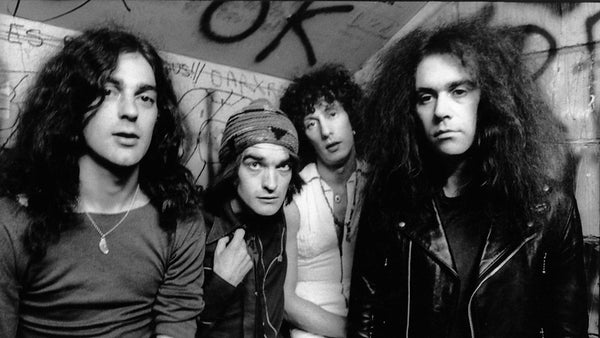This month we bring you a re-issue of the three albums recorded by The Pink Fairies for Polydor in the early 70s.
The roots of The Pink Fairies lie with The Deviants, a combo fronted by Mick Farren, a writer and scene-maker with the International Times, which also featured Duncan ‘Sandy’ Sanderson (bass), Russell Hunter (drums) and Paul Rudolph (guitar). After a disastrous tour of Canada and the USA in 1969, Farren was sacked, and returned to the UK, leaving the musical core of the band to spend the winter of 1969-70 living with the Family Dog community in San Francisco, in a state of stoned poverty.
Back in London, Farren, alongside former Tyrannosaurus Rex percussionist Steve Took and former Pretty Things/ Tomorrow drummer Twink started hanging out, and it was Twink who came up with the concept – such as it was – of The Pink Fairies. After some transatlantic phone calls, it was decided that the ‘frisco-domiciled trio would return to the UK and The Pink Fairies were convened.
At the outset, it looked somewhat unpromising. No money, no management, no record deal; just a morass of former contractual commitments to sort out, and a vague notion from Twink that the PFs would play totally for free for the first six months of their career. Although this policy was not strictly adhered to, it was the period when the Fairies, often in double harness with space-rockers and fellow West Londoners Hawkwind, became a familiar feature at benefits, street parties and free concerts. They could always be counted on to set up in the dirt of the camp sites at most rock festivals.
Perhaps the first, most high-profile event that the Fairies performed at in their early incarnation was the two-day Phun City Festival, co-organised (if that’s the word) by Mick Farren, which took place just outside Worthing on England’s South coast on 24th-26th July 1970. Other acts on the bill were The Pretty Things, Kevin Ayers, Edgar Broughton, Mungo Jerry, Michael Chapman, William Burroughs (!) and The Humblebums, all of whom performed for free. The only band that refused to play for nothing (ironically enough), was Free! The most important band on the bill, at least as far as an influence on the PFs were concerned, was The MC5, making their UK debut. The original idea was to have The Merry Pranksters and The Grateful Dead headline, but that plan came to nothing, and the incendiary set by the MC5 inspired Twink and Hunter to dispense with their clothes and embrace naked in front of the stage. When the Fairies wanted to make a point they went straight at it.
On the road, the Fairies went from strength to strength. Through the summer of 1971 they developed a raw, powerful act that depended heavily on the unrelenting two drummer line-up, and relied very much on Twink's erratic showmanship as a visual front. Despite their kind of ramshackle vibe, the band managed to secure a record deal – but not before Twink quit and high-tailed it to Morocco. They were signed by Polydor and the resultant debut album, Never Never Land, is a rambunctious, occasionally unfocused set, but does undoubtedly have more than its fair share of musical high points.
The second PFs album, What A Bunch of Sweeties, was an incremental improvement on the debut, even though, like its predecessor, it lacked really strong songs. Their version of The Beatles’ ‘I Saw Her Standing There’ was rocking fun, and the interpretation of The Ventures ‘Walk Don’t Run’, presaged by their own lyric, was similarly gutsy. However, the wheels threatened to come off the band charabanc when guitarist Paul Rudolph quit – apparently, his personal drug usage had reached critical mass.
Rudolph’s replacement, ex Junior’s Eyes guitarist Mick Wayne, was never an easy fit, and yielded only one single, ‘Well Well Well’/ ‘Hold On’. The internal band dynamic was wrong, and Larry Wallis, then of UFO, was hurriedly drafted in. Wallis’ induction was a welcome intervention, and his melodic values, and, most crucially, his songwriting talents, added new impetus and vigour to the Fairies. The third album, Kings of Oblivion, was a much-improved set as a result. It contains ‘City Kids’ originally called ’52 Card Pickup’ and is one of the PFs finest moments. It was covered (brilliantly so) by Motorhead – no surprise, as Wallis was in the original Motorhead line-up. The song has the kind of drive that’s a distant relation of the MC5 Back in the USA opus, ‘Shakin’ Street’, but with their own distinctive West London speed-freak style.
Although Wallis’ induction bought the band a seeming new lease of life, the music scene was moving on, and the Pink Fairies were in no state to either react to, or take advantage of, the emergence of Punk, where bands such as The MC5 were regarded as a major influence. There were some desultory stabs at getting the band back together, but that was pretty much it as far as the PFs were concerned.
For a short while The Pink Fairies made an enjoyably unwholesome racket, and added some sulphate-fuelled fun and hi-jinks to the Brit rock scene.
With thanks to Alan Robinson

